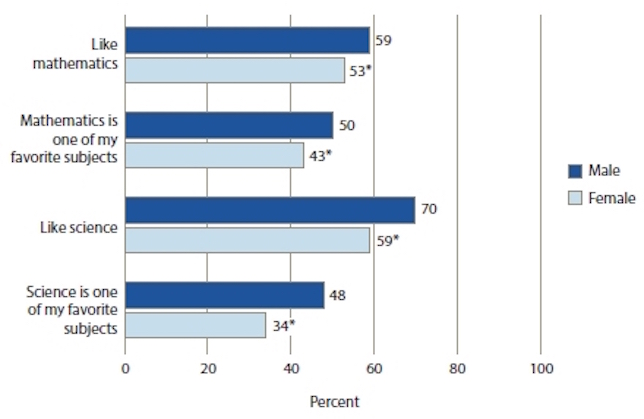Out of High School Men Liked Math and Science More Than Women
- By Dian Schaffhauser
- 02/17/15
No matter how you cut it, in 2009 female students didn't like math or science as much as male students in high school, even though a higher percentage of them earned credits in certain STEM courses.
When asked to indicate how much they agreed or disagreed with statements such as, "I like mathematics/science," or "Mathematics/science is one of my favorite subjects," male high school graduates were more likely to agree than female graduates. The difference was particularly marked for science. Whereas 34 percent of women agreed or strongly agreed that science was one of their favorite subjects, 48 percent of men said the same.
Those results come out of a study done by researchers from the American Institutes of Research and Activate Research and overseen by the National Center for Education Statistics. The findings were based on data from the National Assessment of Educational Progress (NAEP), otherwise known as the "nation's report card," and assessment of what students know and can do in various subject areas.
Females pursued algebra II, pre-calculus, advanced biology, chemistry and health science/technologies at greater rates than males, whereas more males tackled physics, engineering, engineering/science technologies and computer/information science. The most sizable differences between the genders showed up in advanced biology and computer/information science. Both show a gap of at least 10 percent in the count of young men or young women who graduate from high school with credits in those courses.

Source: U.S. Department of Education, Institute of Education Sciences, National Center for Education Statistics, High School Transcript Study (HSTS), 2009; National Assessment of Educational Progress (NAEP), 2009 Mathematics and Science Assessments.
Among 2009 high school graduates who had earned credits in specific STEM courses, overall, males had higher average NAEP "scale scores" than females. In advanced math courses, such as algebra II and calculus, the men's average was five and seven points higher, respectively, on the NAEP scale of 300, than the women's average. The same was true for advanced science courses; whereas male students earned a NAEP scale score of 167 in advanced biology, the average for female students was 159.
The closest difference was for advanced environmental and earth sciences and engineering, where the average tally for both genders came in within a point of each other.
The data for the study came from two sources, a 2009 NAEP high school transcript study, which looks at high school graduates' course-taking patterns, credits earned, grade point average, performance on NAEP exams and demographics such as gender and race; and the 2009 NAEP grade 12 math and science student questionnaires, which gather student feedback on classroom experiences and educational support.
The report, "Gender Differences in Science, Technology, Engineering, and Mathematics (STEM) Interest, Credits Earned, and NAEP Performance in the 12th Grade," is available online.
About the Author
Dian Schaffhauser is a former senior contributing editor for 1105 Media's education publications THE Journal, Campus Technology and Spaces4Learning.